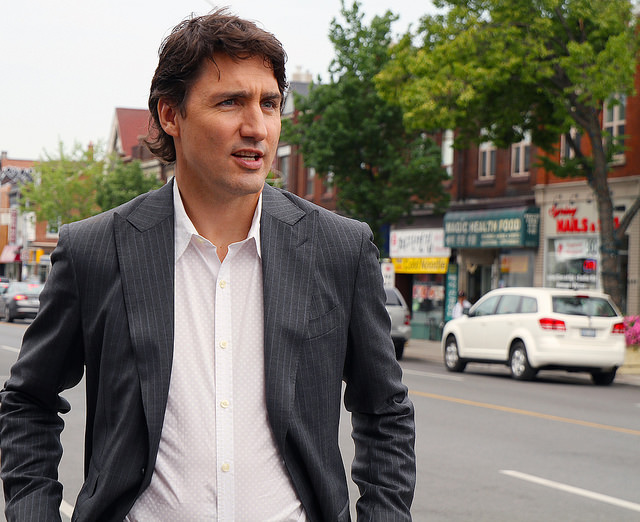Like this article? Chip in to keep stories like these coming.
![]()
During his campaign kickoff speech on August 4, Liberal leader Justin Trudeau pegged the New Democrats’ plan to raise the minimum wage to $15 an hour in federally regulated sectors as an attempt to “peddle false hope,” claiming the change would not benefit 99 per cent of minimum wage earners in Canada.
Global News later corrected this claim. Trudeau’s team had only calculated those earning minimum wage, which was 413 workers, neglecting those who make under $15 an hour but make more than their province’s minimum wage. With these specifications, the number of workers who would benefit from the NDP’s plan was pinned at approximately 135,000.
Trudeau then went on to say that “the NDP will talk about helping the middle class, but they won’t raise taxes on the wealthiest Canadians.” Trudeau’s middle class family tax cut, funded through a tax hike on the rich at a “marginal” rate came under attack by the NDP, who claimed two thirds of Canadians would not benefit from the tax cut based on the threshold of what the policy would consider “middle class.”
Additionally, if elected, the Liberals plan to send a monthly “Canada Child Benefit worth up to $533.” That is the extent, however, and during the Maclean’s leaders’ debate on August 6, a question was posited to Trudeau about if such a tax package goes far enough to support the middle class.
By way of contrast, the NDP’s plan proposes no income tax hike, but Mulcair has committed to raise the corporate tax to somewhere around 19 per cent, though no concrete numbers have been mentioned.
The party has also taken a strong stance on implementing $15 per day child care, echoing the progressive moves in Quebec with their similar $7 per day plan. In terms of the economy and infrastructure, the party seeks to renew the manufacturing sector as well as address the infrastructure deficit.
As the polls seem to remain unchanged, even after the first debate, Trudeau’s attacks on the NDP seem like a strange attempt to out-progressive Mulcair.
These recent attempts to disparage Mulcair’s leadership have become, as demonstrated, baseless, but they also seem desperate as Trudeau is likely feeling elbowed out of the conversation considering the polls predict a two-way race between the Conservatives and the NDP.
Even the Conservatives have begun to notice the growing political clout of the NDP as they supplant the Liberals.
In turn, Harper’s attacks on Trudeau — an opponent he can likely beat — had dominated the airwaves even before the writ was dropped. The “he’s just not ready” campaign characterizes the Conservatives keeping Trudeau in the spotlight and in the centre of political discourse, attempting to squash the gains made by the New Democrats by making Trudeau seem like the main opponent.
The Liberals have fallen into even deeper irrelevance with their seemingly flip-flopping track record in Parliament.
While historically they acted as a “public opinion party” by committing themselves to a populist agenda, this tactic has been more of a shot in the foot than an apt strategy. They disillusioned voters by voting for almost all of the Conservatives’ “tough-on-crime” style anti-terrorism legislation, while still claiming that they opposed the bills.
A way to describe these tactics is “out of touch” — the Liberals are trying to reconcile polarized Canadians — some of which who diametrically oppose one another, like the tough-on-crime crowd and progressives — and somehow garner their votes.
If Trudeau wants to remain a strong player in the election race, trying to out-progressive Mulcair is a losing strategy. Calling the NDP out for “misleading” the public on the federal minimum wage pledge while having no recourse in their own plan to address that very issue is, in itself, misleading.
The party still lacks commitments to preserving and re-expanding the decaying manufacturing sector, raising the federal minimum wage, fixing both the faulty Employment Insurance program and the Temporary Foreign Workers program, protecting supply management with the signing of the risky Trans-Pacific Partnership, and improving sources of labour peace that the Conservatives have dismantled — all of which the NDP have committed to. Those stances may bode better with progressives than a tax package.
Trudeau can make allegations about the legitimacy of the NDP’s progressiveness all he likes — but his party is still coming up short.
Nice hair, though.
Dan Darrah is a public policy student at Ryerson University and a journalist at the Ryerson Eyeopener.
This piece originally appeared on Critical Perspectives and is reprinted with permission.
Photo: flickr/ Alex Guibord



